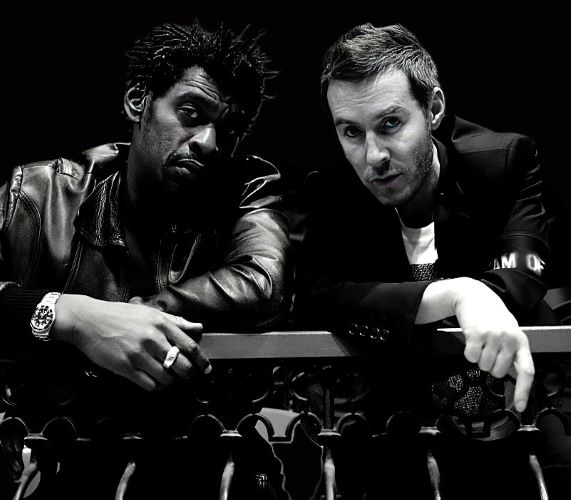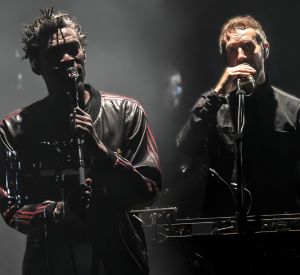Massive Attack is a British musical group formed in Bristol, England, in 1988. Known for pioneering the genre of trip-hop, the band has been influential in shaping the sound of electronic music, blending elements of hip-hop, dub, reggae, soul, and experimental rock. The group was originally formed by Robert Del Naja (aka 3D), Grant Marshall (aka Daddy G), and Andrew Vowles (aka Mushroom), but over time, the lineup has changed, with Del Naja becoming the central figure.
Origins:
Massive Attack emerged from the Bristol underground scene, particularly from a collective called The Wild Bunch, one of the UK’s first sound systems that combined various styles of black music, including reggae, hip-hop, and funk. Members of The Wild Bunch, including 3D, Daddy G, and Mushroom, were instrumental in establishing the trip-hop movement, characterized by its moody, atmospheric beats and eclectic sampling.
Early Career and Blue Lines (1991):
Massive Attack’s debut album, “Blue Lines” (1991), is considered a landmark in electronic music. The album fused elements of hip-hop, dub, soul, and reggae, with a unique and groundbreaking production style. Tracks like “Unfinished Sympathy,” featuring vocals by Shara Nelson, and “Safe from Harm” became iconic, with “Unfinished Sympathy” often cited as one of the greatest songs of all time. Neneh Cherry, a fellow Bristol artist, played a key role in encouraging and supporting the band in their early years, including financially supporting “Blue Lines.”
“Blue Lines” is widely regarded as the birth of trip-hop, a term that became synonymous with the melancholic, atmospheric sound that Massive Attack pioneered.
– Hire Massive Attack for your festival or concert plans! – (t,s)
Protection (1994):
In 1994, Massive Attack released their second album, “Protection.” The album solidified their reputation as innovators, featuring collaborations with vocalists like Tracey Thorn of Everything But The Girl and reggae artist Horace Andy, a long-time collaborator. Tracks like “Protection” and “Karmacoma” were critical and commercial successes.
“Protection” retained the dark, brooding style of “Blue Lines” but introduced more sophisticated production techniques and a more varied musical palette. Massive Attack began moving away from hip-hop influences toward more abstract and atmospheric sounds. The album was also produced by Nellee Hooper, a key figure in British electronic music.
Departure of Mushroom and Mezzanine (1998):
Massive Attack’s third album, “Mezzanine” (1998), marked a significant shift in their sound. Darker, more abrasive, and guitar-driven, “Mezzanine” fused post-punk, rock, and electronic elements. The album is widely regarded as their masterpiece and remains one of the most influential records of the 1990s.
Notable tracks include:
- “Teardrop,” featuring the haunting vocals of Elizabeth Fraser of the Cocteau Twins, which became one of the group’s most iconic songs.
- “Angel,” a brooding track featuring Horace Andy.
- “Inertia Creeps,” which exemplifies the dense, moody production style of the album.
“Mezzanine” was a commercial success but also marked the departure of Andrew Vowles (Mushroom), who left the group over creative differences, largely due to the shift in musical direction toward a more rock-oriented sound. Despite the tension, “Mezzanine” was a critical triumph, praised for its innovation and the way it blurred genre boundaries.
100th Window (2003):
By the time of “100th Window” (2003), Massive Attack had become primarily a vehicle for Robert Del Naja, as Grant Marshall (Daddy G) took a break from the band during its recording. “100th Window” continued the darker, more minimalist sound introduced on “Mezzanine” but was less well-received critically, with some critics feeling it lacked the diverse collaborations and organic elements of their earlier work.
However, it still showcased Massive Attack’s signature brooding atmosphere, and tracks like “What Your Soul Sings” (featuring Sinéad O’Connor) and “Special Cases” kept their fan base engaged.
Return of Daddy G and Heligoland (2010):
In 2010, Massive Attack released their fifth studio album, “Heligoland,” marking the return of Daddy G to the group’s lineup. “Heligoland” featured a range of collaborations, including Tunde Adebimpe of TV on the Radio, Guy Garvey of Elbow, Martina Topley-Bird, and Damon Albarn. While not as groundbreaking as their earlier work, the album was praised for its emotional depth and diverse musical textures.
Notable tracks include “Paradise Circus” and “Pray for Rain,” which continued to explore the dark, cinematic soundscapes that had become the band’s trademark.
Political Activism and Legacy:
Massive Attack, particularly Del Naja, has been known for their political engagement. Del Naja has been an outspoken critic of war, environmental issues, and political corruption. The group has used their platform to raise awareness on issues like the Iraq War and climate change, even partnering with organizations such as Greenpeace.
There have been long-standing rumors linking Del Naja to Banksy, the elusive street artist, due to their shared political ideals and their connections to the Bristol art scene. Though Del Naja has denied being Banksy, he has acknowledged their friendship.
Influence and Legacy:
Massive Attack has had a profound influence on a wide range of artists and genres. They are considered pioneers of trip-hop, a genre that includes acts like Portishead and Tricky (a former collaborator who left the group after “Blue Lines“). Their moody, atmospheric sound has influenced a wide range of artists in electronic music, hip-hop, and beyond.
Massive Attack’s music has been widely used in film, television, and advertising, further cementing their cultural impact. Tracks like “Teardrop” (famously used as the theme song for the TV show “House”) and “Angel” have become instantly recognizable.
Discography Highlights:
- “Blue Lines” (1991) – Trip-hop classic and groundbreaking debut.
- “Protection” (1994) – A more refined, soul-infused follow-up.
- “Mezzanine” (1998) – Dark, experimental, and widely regarded as their masterpiece.
- “100th Window” (2003) – Minimalist, electronic, and deeply atmospheric.
- “Heligoland” (2010) – A collaborative return, featuring diverse guest artists.
Recent Work and Future:
In recent years, Massive Attack has focused more on live performances and artistic collaborations rather than releasing new studio albums. In 2020, the band released “Eutopia,” a politically charged EP that featured collaborations with thinkers and activists, addressing global issues like inequality and climate change.
Massive Attack‘s legacy remains strong, and they continue to be celebrated for their genre-defying work, innovation in electronic music, and influence on countless artists across various genres.
Their discography includes five studio albums, three compilations, five remix albums, one soundtrack, five EPs, eighteen singles, and twenty-seven music videos.






